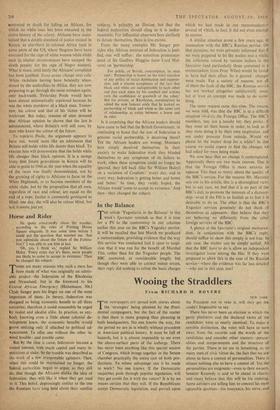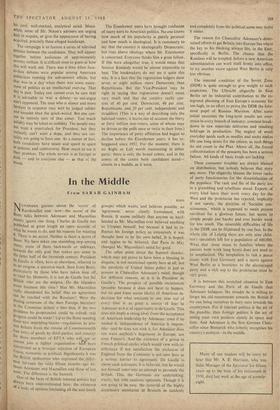Wooing the Straddlers
From RICHARD H. ROVERE
NEW YORK
THE newspapers are spread with stories about the 'strategies' being planned by the Presi- dential campaigners, but the fact of the matter is that there is more groping than planning in both headquarters. No one knows the way, for the period we are in is wholly without precedent in American political history. It must be full of hazards, but it is almost impossible to see even the above-surface parts of the icebergs. There has never been anything like this special session of Congress, which brings together in the Senate chamber practically the entire cast of both pro- ductions. To whose advantage can it be made to work ? No one knows. If the Democratic majorities push through popular legislation, will they get credit for it with the voters? It is by no means certain that they will. If the Republicans accept Democratic legislation, and prevail upon the President not to veto it, will the.y get the credit? Impossible to say.
There has never been an election in which the party platforms and the declared views of the candidates were so nearly identical. To make a sensible distinction, the voter will have to turn away from the records and the words of the candidates and consider other matters—person- alities and temperaments and the structure of the parties. There is no use in lamenting, as so many men of civic virtue do, the fact that we are about to have a contest of personalities. There is almost nothing else to have a contest of. Yet the personalities are enigmatic—even to their owners. Senator Kennedy is said to be ahead in charm. and many believe that this will be his undoing. Some advisers are telling him to conceal his most agreeable qualities--his buoyancy, his verve, and his cool, well-stocked, analytical mind. Mean- while, some of Mr. Nixon's advisers are urging him to acquire, or give the appearance of having acquired, precisely these alleged handicaps.
The campaign is to feature a series of televised debates between the candidates. They will appear together before audiences of approximately seventy million. It is difficult even to guess at how this will work out There was a time When face- to-face debates were popular among American Politicians running for sub-summit offices, but that was in a day when there was some enjoy- ment of politics as an intellectual exercise. That day is past. Today one cannot even be sure that it is advisable to 'win' a debate—to out-argue one's opponent. The man who is slower and more hesitant in response may well be judged solider and sounder than the quick-witted. But one can- not be entirely sure of that either. Too much solidity may be taken as stolidity. The people may not want a smart-aleck for President, but they certainly can't want a dope, and they are cer- tainly not going to have one. As a matter of fact, both candidates have steam and speed to spare In polemic and controversy. How much to use is their problem. The whole terrain is as foreign to both — and to everyone else — as that of the moon. The Eisenhower years have brought confusion of many sorts to American politics. No one knows how much of his popularity is purely personal and how much is ideological. It is customary to say that the country is ideologically Democratic, but rises above ideology where Mr. Eisenhower is concerned. Everyone thinks him a great fellow. If this were altogether true, it would mean that Senator Kennedy would be almost impossible to beat. The bookmakers do not see it quite this way. It is a fact that the registration ledgers show seven or eight million more Democrats. than Republicans. But the Vice-President 'may be right in saying that registration doesn't mean very much and that the country really con- sists of 40 per cent. Democrats, 40 per cent. Republicans. and 20 per cent. independents and straddlers. (This is a way of describing only the habitual voters; it leaves out of account the thirty or forty million non-voters, some of whom may be driven to the polls once or twice in their lives.) The importance of party affiliation had begun to decline before the Eisenhower years; it has to- bogganed since 1952. For the moment, there is no Right or Left worth mentioning in either party; there is only the broad centre, and in the centre of the centre both candidates stand— almost in a huddle, as it were.



































 Previous page
Previous page